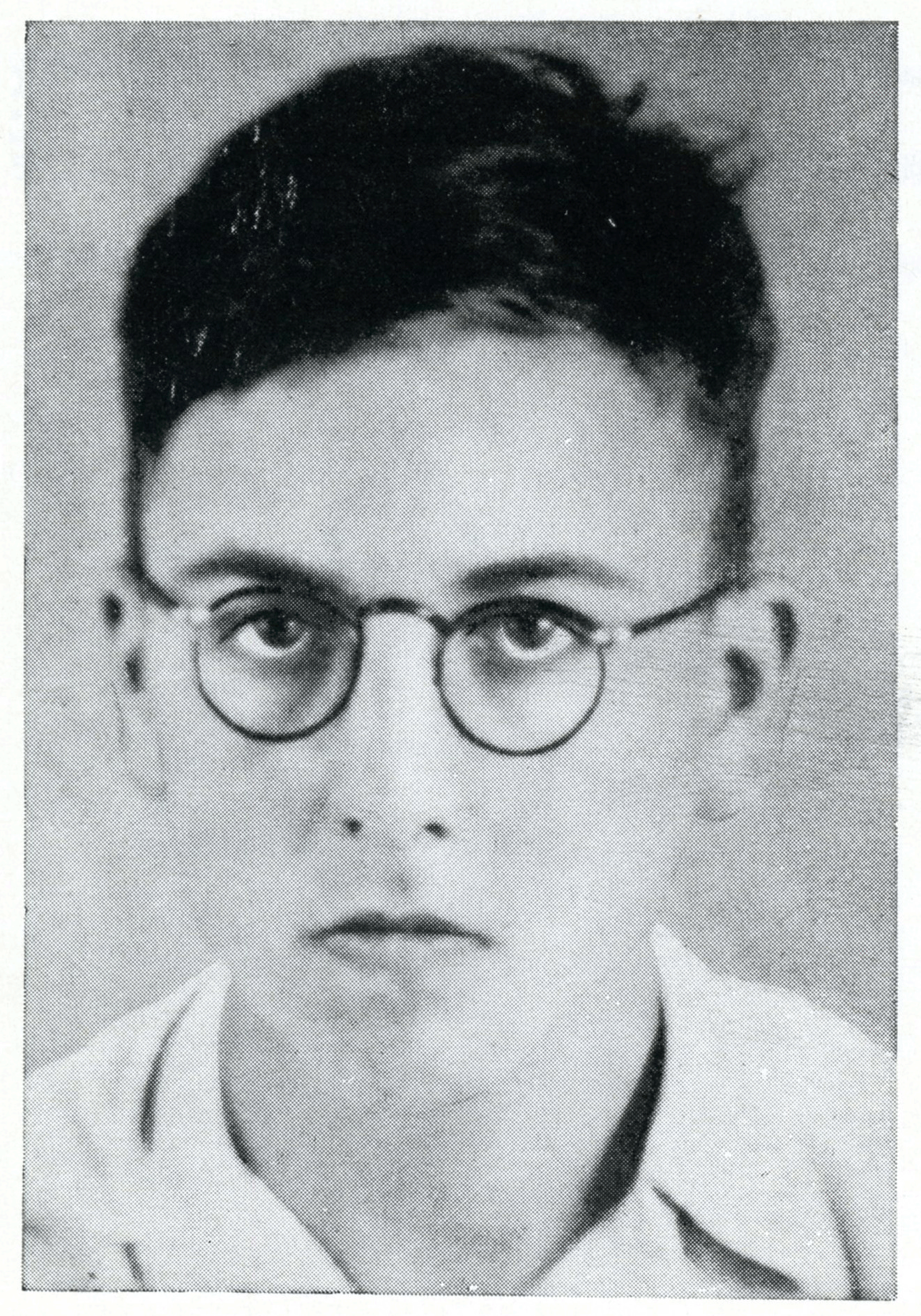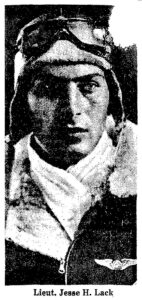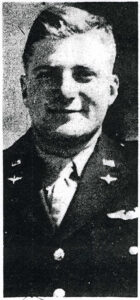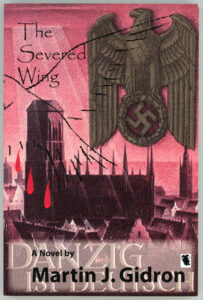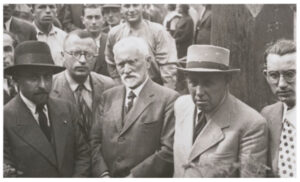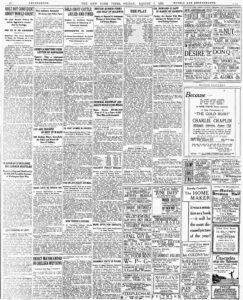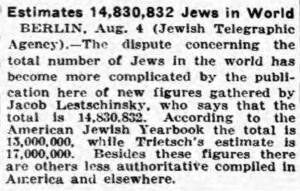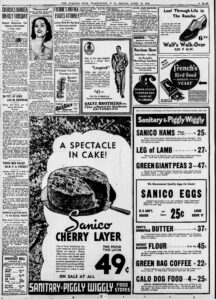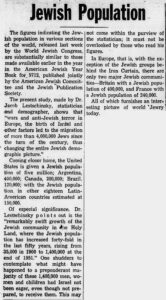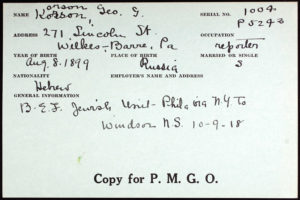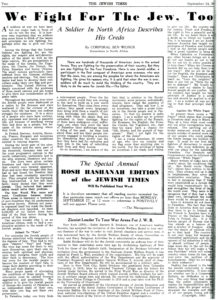“His old man had plunged into America.”
________________________________________
This post – “Measures of Valor: American Jewish Military Service in World War One – Part One” – is the first of three discussions focusing upon the military service of American Jews in the First World War. Ironically, however, matters of fact are often best understood through the lens of fiction, which not uncommonly lends insight into the character of men and the spirit of an age. So, let’s begin with a passage from Saul Bellow’s 1973 novel Humboldt’s Gift, describing the writer “Von Humboldt Fleisher”, who was loosely modeled after the poet, essayist, short story writer, and editor Delmore Schwartz , whose extremely creative yet sadly turbulent life, spanning the mid-part of the twentieth centry, ended all too early.
“…He said that history was a nightmare during which he was trying to get a good night’s rest. … When he spoke of wealth he was in a position to compare Roman luxus with American Protestant riches. He generally got around to the Jews – Joyce’s silk-hatted Jews outside the Bourse.”
“His father, a Jewish Hungarian immigrant, had ridden with Pershing’s cavalry in Chihuahua, chasing Pancho Villa in a Mexico of whores and horses (very different from my own father, a small gallant person who shunned such things). His old man had plunged into America.”
This depiction of Fleisher, mentioned in the Tikvah Fund Podcast of April 3, 2019, “Daniel Gordis (in a conversation with Jonathan Silver on the Rift Between American and Israeli Jews” (specifically at 13:20-13:57), sheds light upon an intriguing void within the annals of American Jewish history. That is, why, in the decades immediately following the First World War’s end, was no comprehensive, detailed, and substantive account of the military service of American Jews during that just-ended conflict created, published, and distributed?
Well, okay… That question’s a bit of a “set-up”, for a nominal account of the World War One military service of American Jews was created, and, was made available to the public.
This was in 1919, only one year after the war’s end.
This publication took the form of the 50-page-long pamphlet The War Record of American Jews – The First Report of War Records of the American Jewish Committee. However, this work, which merely scratched the surface of a topic vast, was mightily dwarfed in length and content by several publications – books, actually – covering the Great War military service of the Jews of Australia, England, France, Italy, New Zealand (and Germany, albeit not Austria-Hungary) which were published in those countries from the 1920s through the 1930s.
Information about the genesis of The War Record of American Jews is available in the “Guide to the Records of the American Jewish Committee – Office of Jewish War Records, undated, 1918-1921, 1962”, a finding aid of the American Jewish Historical Society (at the Center for Jewish History in New York). The text below, about the pamphlet’s creation, is summarized from this document.
There, in a “Historical Note”, it’s reported that, “At the 11th Annual Meeting of the American Jewish Committee (AJC) on 11 November 1917, … members discussed “The matter of collecting complete and accurate statistics of Jews in the military and naval service of the United States…” and resolved that “…the Bureau of Statistics be directed to make every effort to secure data of this character.” This effort was set to be placed under the direction of Julian Leavitt.
This enterprise was reflective of the “longstanding concern of Jewish leadership” to record and publicize accounts of Jewish participation in the armed forces of the United States. This had already resulted in three prior studies:
1) The American Jew as Patriot, Soldier and Citizen, by Simon Wolf (1895), which covered Jewish military service in the United States from the American Revolution through the Civil War;
2) A “Preliminary List of Jews Serving in the Spanish American War”, in the American Jewish Year Book for 5661 (1900-01);
3) “Jews in the United States Army and Navy”, also in the American Jewish Year Book; in the year 5677 (1916-17)).
At the AJC’s 12th Annual Meeting in mid-November of 1918, the organization’s Executive Committee reported that during its meeting of nearly a year before (in mid-December of 1917) the Committee’s bureau of statistics was directed to undertake the task of data collection about American Jewish WW I military service, with American Jewish organizations being contacted for assistance in this task. The work resulted, within the AJC’s Twelfth Annual Report for the year 1918 (issued in 1919), in the creation of the The War Record of American Jews – First Report of the Office of Jewish War Records (OJWR), which was issued on January 1, 1919.
The 13th Annual Report of the AJC contained the Second Report of the OJWR, which was dated 19 October 1919. The number of records collected pertaining to individual servicemen had by then reached 175,000, of which 150,000 were unduplicated from the first effort. Quoting from the Report: “… The present figures tend to strongly confirm the estimate…that the Jews of America have probably contributed, numerically, from thirty-three to fifty per cent more than their quota.”
And, of particular interest (for this purpose of this post!), is this startling statement [My italics.] “The Second Report estimated that if funds were available to complete the full project, the results of which when published, it would comprise three volumes of text and analysis and 12-15 volumes of individual war records.”
“The names and service data of individual Jewish servicemen were obtained from various sources: the JWB (Jewish Welfare Board); national Jewish organizations; local congregations, fraternal organizations, labor unions, and Zionist organizations; newspaper reports; information solicited from servicemen, their families and relatives; and War Department and Draft Board lists.”
“In addition to the collection of basic service data on Jews in the military from these sources, the OJWR sent out 16,000 detailed questionnaires to Jews whom it believed had served as Commissioned Officers and to servicemen, both Officer and the Ranks, or their next of kin, whom it believed had been wounded or killed, and/or were cited for honors. As of the date of the Second Report, 5000 replies had been received.”
The 14th Annual Report of the AJC contained the Third Report of the OJWR, dated 14 November 1920. This edition of Third Report anticipated the publication of a Fourth and final report, “now in preparation.”
“The Third Report increased the total number of Jews who had served from 200,000 to 225,000. The Report also confirmed a 4 per cent Jewish participation in military service in comparison to the 3 per cent Jewish population of the U.S., and a volunteer rate of 20 per cent, “…unexcelled, as far as known, by any other element of the American population.” The OJWR estimated that approximately 2,800 Jews had died in service.”
________________________________________
Here’s an article about the Third Report of the OJWR, as it appeared in The Jewish Exponent on February 18, 1921. A transcript follows…
 LATEST FIGURES UPON THE RECORD OF AMERICAN JEWS IN THE WAR
LATEST FIGURES UPON THE RECORD OF AMERICAN JEWS IN THE WAR
From all present indications the record of Jewish service in the war appears to have been remarkable in these respects:
1. The total number of Jews in the service during the war may be conservatively estimated on the basis of available evidence, at from 200,000 to 225,000.
2. Proportionately, although they constituted but three per cent of the total population of the United States, they appear to have contributed more than four per cent of the armed forces of the United States which, on Armistice Day, numbered 4,800,000.
3. The volunteer spirit appears to have been the principal factor in the contribution. According to the best evidence there were nearly 40,000 Jewish volunteers in the service, or practically twenty per cent of the total Jewish contingent. This is a record unexcelled, as far as now known, by any other element of the American population.
4. The record of honors conferred upon Jewish soldiers for valor in action is notable. No less than 1100 citations for valor are on file in the office of Jewish War Records. Of these 723 were conferred by the American command, 287 by the French, 33 by the British and 46 by various other allied commands. Of the most valued Congressional Medical of Honor – of which only 78 have been conferred to date – at least three were awarded to Jewish soldiers. The Distinguished Service Cross is worn by at least 150 American Jews, the rare French Medaille Militaire by four American Jews and the Croix de Guerre by 174 Jews in the A.E.F.
5. There were nearly 10,000 Jewish commissioned officers in the several branches of the service. In the army there were more than 100 colonels and lieutenant colonels, more than 500 majors, 1500 captains and over 6000 lieutenants. In the navy there were over 900 Jewish commissioned officers, the highest rank reached being that of rear admiral. In the Marine Corps there were over 100 Jewish commissioned officers, including one brigadier general.
6. The total of Jewish casualties, according to the latest estimates, was from 13,000 to 14,000, including about 2800 who made the supreme sacrifice.
________________________________________
But, there would be no further reports, for the OJWR closed on 31 July 1921, Leavitt having remained director throughout its existence. Whether a “paper trail” concerning the creation of The War Record of American Jews, and the eventual abandonment of the project, still exists (let alone if such documents can be accessed now in 2020) is unknown.
In any event, what happened?
I don’t know. But, I can offer conjecture…
As discussed by Harold Brackman in his recent Algemeiner essay, Dreyfus’ Long Shadow for American Jews, literary and social antisemitism became increasingly explicit and open within the United States through the 1920s. And, if politics and culture reflect and reinforce one another – as they’ve done in the past; as they do in today 2020; as they always shall – this was doubtless true a century ago: during the decade immediately following the First World War
In relation to the above, it’s worth nothing that on September 25, 1919, less than a year after the war ended, President Woodrow Wilson presented his Final Address in Support of the League of Nations (mentioned in the Tikvah-Fund podcast at 5:30 to 6:00). Therein, he stated, “I find, moreover, that there is an organized propaganda against the League of Nations and against the treaty proceeding from exactly the same sources that the organized propaganda proceeded from which threatened this country here and there with disloyalty, and I want to say – I cannot say too often – any man who carries a hyphen about with him carries a dagger that he is ready to plunge into the vitals of this Republic whenever he gets ready.”
And: “If I can catch any man with a hyphen in this great contest I will know that I have got an enemy of the Republic.”
So, amidst overlapping currents of openly expressed antisemitism, and the natural desire of the Jews of the United States – like any community of newly arrived and nauralized immigrants, let alone their descendants – to become fully Americanized, perhaps it was felt better in senses both individual and collective not to call attention to oneself “as a Jew” – as a member of a distinct and collective people, even in the most genuinely patriotic context – instead defining and viewing one’s identity solely in religious and individualistic terms, and even then, solely within the larger context of American history and society.
As discussed in the podcast, this mindset could be viewed as an illustration of different concepts of Jewish identity manifested by the Jews of the United States (let alone, in a historical sense, any diaspora community) versus a setting where Jews would be politically autonomous. Such, as the pre-1948 Yishuv, and, the post-May 1948 nation state of Israel. There, by virtue of a “return” to active political, social, and military autonomy, even if that autonomy has often been ambiguous and uncertain, the ethos was different. The reason being, that the re-emergence of active Jewish nationalism (well, it never really went away) and the re-establishment of the state of Israel confronted the Jewish people with the implications of returning to and acting within history, with all the challenges, complexities, and compromises – let alone sorrows and joys – implicit to nationhood.
(Certainly these categories of thought and identity can painted in very broad and many-hued strokes. There has always been enormous variation in political, ideological, and religious opinion among the Jewish people, whether in Israel, the United States, or elsewhere. Alas, “geography” alone – being a little euphemistic, there – has never been a guarantee of common sense, political wisdom, ethics, or a grasp of history, as explained here, here, and especially in Daniel Gordis’ Times of Israel Essay of March 23, “We will guard and protect you’: Our forgotten promise to Israel“. In any event, I think Gordis and Silver’s discussion of this topic offers a profound grasp of how history is perceived and acted upon – knowingly and unknowingly; by decision and default – by groups and individuals alike.)
In sum, America offered – ostensibly, in theory, and typically in reality (whether that reality emerged from indifference, calculation, or a place of uneasy compromise between the two) a refuge from history.
So with that refuge from history, came a release from history. Not, of course, American history, but Jewish history.
Well, maybe. Well, thus far. Or, to paraphrase an adage about military conflict, “You may not be interested in history, but history may be interested in you.” Put it another way (here once again fiction illuminates fact!): As science-fiction writer Philip K. Dick explained in his short story, “We Can Remember It For You Wholesale”, “…an illusion, no matter how convincing, remained nothing more than an illusion. At least objectively. But subjectively, quite the opposite, entirely.”
(And there I’ll leave the matter.)
For a greater understanding of the complexities this subject, you might want to read Are We One? – Jewish Identity in the United States and Israel, by Dr. Jerold S. Auerbach (Rutgers University Press, 2001), Assimilation and Its Discontents (1995) by the late Barry M. Rubin, and, America, Its Jews, and The Rise of Nazism, by Dr. Gulie Ne’eman Arad (Indiana University Press, 2000). The latter places the events discussed in David S. Wyman’s well-known The Abandonment of the Jews in a deeper, clearer, and disconcerting historical context. Particularly interesting in Dr. Arad’s book is the chapter “Hard Times in the Golden Medine – The Jewish Question in the American Context”, which covers American Jewry during the the decade in question for “this” post: the 20s and 30s. On a different nore, for a candid sociological picture of Jews of the United States – neither lachrymose nor indulging in Spielbergian hagiography – I suggest Charles S. Liebman’s The Ambivalent American Jew – Politics, Religion, and Family in American Jewish Life, the observations of which, though published in 1973, remain as valid in 2020 as they did forty-seven years ago.
So, returning to our subject… In the context of the 1920s, by the time the American Jewish Committee had amassed sufficient information to create one or more (and probably several) volumes about the military service of American Jews during the just-ended conflict, it would not be surprising if the motivation, desire, and confidence to pursue the project had simply evaporated. The only publication that emerged from the AJC’s well-intended efforts was entirely incommensurate with the scope of the military service of American Jews during that conflict, let alone the range of historical memory and archival information that awaited collection, contemplation, analysis, and presentation.
And there, the effort ended.
In any event… Two decades later after the Great War’s end, the absence of comprehensive information about the WW I military service of American Jews was discussed in the April 2, 1943 issue of Pittsburgh’s Jewish Criterion. This appeared in a brief article which presented the thoughts of Dr. Joshua Bloch, chief librarian of the Jewish Division (now the Dorot Jewish Division) of The New York Public Library. Dr. Bloch’s comments about the absence of an account of Jewish military participation in the First World War were elicited in the context discussing the imperative of chronicling Jewish military service in the Second World War, which – for the United States – had commenced two and a half years previously.
A transcript of the Criterion’s article appears below this image; the italics are my own.
 Jewish Record in Last War Never Revealed, Charge
Jewish Record in Last War Never Revealed, Charge
NEW YORK – Dr. Joshua Bloch, head of the Jewish Department of the New York Public Library and noted authority in the field of Jewish research, charges in the Congress Weekly that “The Jews of America, acting in good faith, placed in the custody of the American Jewish Committee the records of their patriotism during the first World War,” but that the, “full record of American Jewish participation has not been made public.”
“Whether the appalling manner in which this undertaking was bungled is due to bureaucratic arrogance or inefficiency or to a well-known theory of the Jewish self-effacement and the negation of our historic identity,” he declares, the Committee has never released a complete record of the contribution made by 150,000 Jews to the winning of the last conflict.”
Pointing out that “the American Jews were required to provide the required funds, a total close to $150,000,” Dr. Bloch asks the fate of the records, of which he says, “it is rumored that a good many are no longer in existence.” [In this he seems to have been fortunately incorrect, though he may have not known so at the time.]
The article concludes, “Fated to share in another world-wide ordeal of mankind, at the greatest cost to out people, we now again face the task of assembling the records of our service and sacrifice, not alone to satisfy our sense of pride and dignity, but to preserve a moral historic claim with which our future welfare is closely bound up. The undertaking of a quarter of a century ago should serve as an example of pitfalls to be avoided. Obviously the organizations and the people connected with the American Jewish Committee and agencies under its control can no longer be entrusted with an enterprise which proved to be far beyond their capacity or sense of responsibility. It is high time that new and more responsive persons be brought in to this and similar public activities.”
________________________________________
Well, what about The War Record of American Jews? As mentioned in the Center for Jewish History’s finding aid, “The First Report documented the creation of 100,000 records of individuals identified as Jews and estimated that a total of 150,000 to 200,000 Jews had served in the American armed forces,” and noted that, “the percentage of Jews serving in the military exceeded their percentage of the U.S. population, especially in the combat arms.” Book director Julian Leavitt concluded that “The Jews of America have contributed their full quota to the winning of the war, and a generous margin beyond their quota; that they have enlisted cheerfully, fought gallantly and died bravely for the United States.”
In terms of content, the book is divided into three major sections.
The first section (pages 7 through 15), a, “Report on the Collection of Jewish War Records,” presents the numbers of Jews serving in different branches of the military, a comparison of the number of Jews in the military against the overall Jewish population in the United States, and the distribution of Jews in combatant and non-combatant branches of the armed forces, concluding with the numbers – as then definitively known, and as estimated – of Jewish military casualties.
The second section (pages 15 through 29) is a, “…tentative list of official citations noted to date, although manifestly incomplete, [which] will serve to give an idea of the valor of Jewish soldiers in action.” Notably, the book states, “The list of all citations will therefore be prepared for publication as soon as sufficient information with respect to these honors shall be available.” However, the book neither presents the criteria by which these soldiers were selected, nor does it specify the award(s) for which the soldiers received citations. (More about these men, below.)
Finally, the third section of the book (pages 30 through 50) – the Appendix – is a “Note on Methods of Search”, actually a, “Reprint of an article “The Collection of Jewish War Statistics,” from the American Jewish Year Book 5679 (1918-19).” Obviously rather “dry” and not amendable for publication in a newspaper (!), this section includes eight tables presenting the actual counts of Jews serving in all branches of the military, by such criteria as state and city of residence, within branches of service in the army, and – for officers – by rank in the Army, Navy, and Marine Corps. The final table lists the “Ratio of Jewish Casualties to Total Casualties with the American Expeditionary Forces Recorded to November 1, 1918.
That’s lots of data.
So, some thoughts and questions.
The AJC’s pamphlet is an important starting point, but it seems that the whole endeavor was undergirded by the need – a need so deeply internalized that its presence may have been simply taken a priori for granted – to validate and legitimize the “place” of American Jews within the larger context of American society, rather than the simple, nominal motivation to record, preserve, and present official history and personal memory. So, while thirty of the book’s fifty pages are devoted to the presentation and discussion of statistics, only 15 pages actually comprise – in abbreviated form; in perfunctory form – information about the soldiers themselves, as people; as individuals; as men. This manner of chronicling Jewish military service, and thereby refuting animosity against Jews and validating Jewish citizenship and patriotism – through statistics; through objective fact – similarly appeared in the context of documenting (during World War One and after) the military service of German Jews, and manifested itself in reporting about American Jewish military service twenty years later, during the Second World War. But, however historically worthwhile and well intended, I can’t help be reminded of Maurice Samuel’s observation in The Gentleman and The Jew, to the effect that, “The argument was sound in theory, but rather shaky in practical application. It neglected, first, to ask whether anti-Semites would look when Jews pointed.”
Anyway, for the AJC’s researchers, compilers, and editors, what was book’s intended audience? The Jews of the United States, with the book being a historical record and symbol of collective pride and self-assurance? Or nebulously, American society “in general” – however viewed and imagined; however aspired to; however viewed with a combination of respect, devotion, and patriotism, let alone trepidation, fear, and awe – with the book being a literary form of social propitiation, during a time of ambivalence and uncertainty?
The answer, probably, was both.
Anyway…
Though I’ve primarily focused on the Jewish military experience during the Second World War (and still do), I’ve also been attempting to identify American Jewish military casualties of WW I (killed, wounded, and POWs). Inspiration for this project has arisen from many sources, in particular some news items published by the Jewish Telegraphic Agency in the early 2000s.
This project has proven to be a little challenging, primarily because there’s no single, pre-existing source of such information that can be entered (albeit with lots of digitizing and / or typing!) into a database, unlike Les Israelites dans l’Armée Française (for WW I French Jewish military casualties), or Die Jüdischen Gefallenen Des Deutschen Heeres, Deutschen Marine Und Der Deutschen Schutztruppen 1914-1918 – Ein Gedenkbuch (for German Jewish military casualties in the same war), where the information – a lot of it – is already “there”.
So, I’ve investigated a wide variety of digital, textual, and microfilm records from the years of WW I, which sometimes contradict one another.
Perhaps in time I’ll finish the work. At the same time, I wouldn’t be surprised if upon the yet-unknown date of the project’s completion, “that” world will differ greatly from the world today, in 2020.
The way things are going, it probably will. But, that’s the subject of a different sort of essay.
So, anyway…
…for now, here’s a random “sample” of the information I’ve acquired in this endeavor: A list of American Jewish soldiers who were casualties on the 12th of October in the year 1918 (or, 6 Cheshvan 5679).
Of the men listed below, two, Pvt. Samuel Goldstein and 2 Lt. David Hochstein, were never found. Perhaps they’re among the 1,673 unknowns buried at American Battle Monuments Commission Cemeteries in Europe. The number of unknowns at each such cemetery, derived from downloading and analyzing records from the ABMC website, is listed below:
Aisne-Marne – 249
Brookwood – 41
Flanders – 21
Meuse-Argonne – 486
Oise-Aisne – 601
Saint Mihiel – 137
Somme – 132
Suresnes – 6
So, some names.
Killed in Action
– .ת. נ. צ. ב. ה –
תהא
נפשו
צרורה
בצרור
החיים
Bereznitzki, Benjamin, PFC, 1,900,127
82nd Infantry Division, 325th Infantry Regiment, M Company
Mr. Julius Miller (friend), 126 Charles St., Fitchburg, Ma.
61 B Valley St., Lawrence, Ma.
Born Grodno, Russia, 4/24/90
Vocation: Junkman (self-employed), Lawrence, Ma.
Meuse-Argonne American Cemetery, Romagne-sous-Montfaucon, France – Plot D, Row 29, Grave 2
________________________________________
Blick, David, Pvt., 1,281,849
29th Infantry Division, 114th Infantry Regiment, K Company
Wounded 10/12/18; died of Wounds 10/21/18
Mr. Samuel Blick (father), 549 Livingston St., Elizabeth, N.J.
Miss Lillian Blick (sister), 1056 Elizabeth Ave., Elizabeth, N.J.
Born Odessa, Russia, 1894
Oheb Shalom Cemetery, Hillside, N.J. – Buried 7/17/21
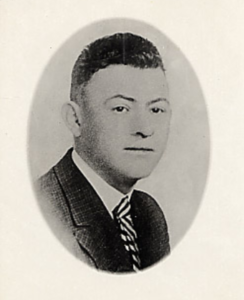 Portrait c/o FindAGrave contributor Robert
Portrait c/o FindAGrave contributor Robert
________________________________________
Cohen, Samuel, Cpl., 1,278,184
29th Infantry Division, 113th Infantry Regiment, D Company
Mrs. Lena Cohen (mother), 207 16th Ave., Newark, N.J.
232 Seymour Ave., Newark, N.J.
Born Newark, N.J., 1899
Place of burial unknown
Cohn, Oscar, Pvt., 368,930
29th Infantry Division, 114th Infantry Regiment, K Company
Mrs. Regina Cohen (mother), 210 West 109th St., New York, N.Y.
403 Avenue C, West Brooklyn, N.Y.
Mrs. Theresa Doctor, Mrs. Jennie Galluber, Mrs. Martha Pincus, Joseph, and Walter (sisters and brothers)
Born New York, N.Y., 4/13/96
Brooklyn Eagle 8/28/21
Union Field Cemetery, Ridgewood, N.Y. – Buried 8/28/21
Eisenberg, David, Pvt., 482,350
4th Infantry Division, 39th Infantry Regiment, B Company
Died of Wounds
Mrs. Rose Eisenberg (mother), 3147 Carlisle Place, Chicago, Il.
Meuse-Argonne American Cemetery, Romagne-sous-Montfaucon, France – Plot C, Row 45, Grave 12
________________________________________
Felbel, Frank J., 2 Lt.
1st Infantry Division, 28th Infantry Regiment, I Company
Mr. Jacob Felbel (father), 216 W. 89th St., New York, N.Y.
Born New York, N.Y., 12/29/89
Meuse-Argonne American Cemetery, Romagne-sous-Montfaucon, France – Plot A, Row 42, Grave 36
 Portrait c/o FindAGrave contributor Jim Craig
Portrait c/o FindAGrave contributor Jim Craig
________________________________________
Feldberg, Harry, PFC, 2,672,238
82nd Infantry Division, 325th Infantry Regiment, B Company
Mr. Isadore Feldberg (brother), 345 Georgia Ave., Brooklyn, N.Y.
21 East 117th St. / 105 Henry St., New York, N.Y.
Born Kiev, Russia, 2/15/91
Vocation: Salesman, Bird-Ston Dress Co., 114 E. Broadway, New York, N.Y.
Meuse-Argonne American Cemetery, Romagne-sous-Montfaucon, France – Plot B, Row 19, Grave 30
Frank, Max, Pvt., 366,741
29th Infantry Division, 114th Infantry Regiment, M Company
Mrs. Pauline Frank (mother), 109 Cole St., Jersey City, N.J.
23 Arch St., New Haven, Ct.
Born New York, N.Y., 6/21/93
Vocation: Building Clerk, Sperry & Barnes, New Haven, Ct.
North Arlington Jewish Cemetery, North Arlington, N.J.
Gerson, Raoul, Pvt., 52,801
1st Infantry Division, 26th Infantry Regiment, B Company
Died of Wounds
Mr. Milton T. Levy (friend), 233 Broadway, New York, N.Y.
Born Constantinople, Turkey, 1893
Meuse-Argonne American Cemetery, Romagne-sous-Montfaucon, France – Plot A, Row 34, Grave 31
Goldstein, Hyman, Pvt., 369,024
29th Infantry Division, 114th Infantry Regiment, B Company
Mr. Samuel Goldstein (father), 663 Fox St., New York, N.Y.
Born N.Y., New York, 1893
Place of burial unknown
Goldstein, Ray D., Pvt., 962,305
United States Army Air Service – General Sup. Depot Fairfield, Oh., 678th Aero Squadron
Died of Illness
Mr. and Mrs. Benjamin and Leah J. [1874-1921] Goldstein (parents), 2205 Atlantic Ave., Atlantic City, N.J.
Born Pemberton, N.J., 10/10/95
Vocation: Clerk (Auto Supplies), Reliable Auto Tire Supply Co., Atlantic City, N.J.
Rodef Sholom Cemetery, Cardiff, N.J.
Goldstein, Samuel, Pvt., 1,280,559
29th Infantry Division, 114th Infantry Regiment, E Company
Mrs. Esther Goldstein (mother), 1102 Heck Ave., Asbury Park, N.J.
19 Prospect St., West Grove, N.J.
Born Russia, 4/10/96
Meuse-Argonne American Cemetery, Romagne-sous-Montfaucon, France – Tablets of the Missing
________________________________________
Hochstein, David, 2 Lt.
5th Infantry Division, 60th Infantry Regiment, E Company
Mrs. Helene Hochstein (mother), 421 Joseph Ave., Rochester, N.Y.
Born Rochester, N.Y., 2/16/92
Meuse-Argonne American Cemetery, Romagne-sous-Montfaucon, France – Tablets of the Missing
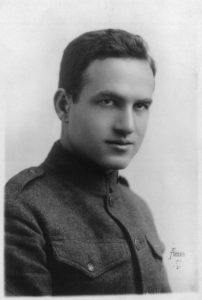 A vast amount of information is available concerning the life and legacy of David Hochstein, a virtuoso violinist of immense talent and promise. The best start might be the David Hochstein Memorial Music School, which was created in his honor and memory.
A vast amount of information is available concerning the life and legacy of David Hochstein, a virtuoso violinist of immense talent and promise. The best start might be the David Hochstein Memorial Music School, which was created in his honor and memory.
________________________________________
Kaplan, Zorach, Pvt., 368,834
29th Infantry Division, 114th Infantry Regiment, D Company
Mr. Morris Resnick (brother in law), 724 Bedford Ave., Brooklyn, N.Y.
232 South 1st St., Brooklyn, N.Y.
Born Minsk, Russia, 3/15/93
Vocation: Tailor, New York City
Other reference(s) give first name as “Zorak” or “Zorch”, while he wrote the name “Zorach” on his Draft Registration Card
Place of burial unknown
Kaufman, Reuben, PFC, 1,280,355
29th Infantry Division, 114th Infantry Regiment, D Company
Mr. Max Kaufman (father), 20 Oxford St., Paterson, N.J.
Born West Hartley Pool, England, 1898
Meuse-Argonne American Cemetery, Romagne-sous-Montfaucon, France – Plot D, Row 13, Grave 29
________________________________________
Krinsky, Louis (Aharon Lev ben Eliyahu), Pvt., 367,710
29th Infantry Division, 114th Infantry Regiment, E Company
(Also slightly wounded 9/17/18)
Mrs. Anna Krinsky (mother), 214 Levonia Ave., Brooklyn, N.Y.
678 Westchester Ave., New York, N.Y.
Born Prusnia, Krona, Russia, 7/15/90
Vocation: Tailor, Joseph Lunz, 31 East 32nd St., New York, N.Y.
Mount Judah Cemetery, Ridgewood, N.Y. – Map 383, Section 2, Block 12, Gate 5, Path R18, Grave 38 (Horodetz & Antip. Society)


Photographs of matzeva by FindAGrave contributor FOIA
________________________________________
Levin, Morris, Pvt., 368,377
29th Infantry Division, 114th Infantry Regiment, E Company
(Also slightly wounded 9/16/18)
Mrs. May Levin (mother), 321 Vernon Ave., Brooklyn, N.Y.
Born Korne, Russia, 1888
Place of burial unknown
Levine, Philip, Cpl.
17th Infantry Division, 83rd Infantry Regiment, A Company
Died of illness in Brooklyn, N.Y.
Place of burial unknown
Lewis, Morse, Sgt., 749,132
3rd Infantry Division, E Company, 3rd Supply Train
Mrs. Ida Newmark (mother), 105 Waumbeck St., Roxbury, Ma.
1 Lt. Bernhard Shalit (cousin), 105 Waumbeck St., Roxbury, Ma.
Born 3/2/96
Meuse-Argonne American Cemetery, Romagne-sous-Montfaucon, France – Plot H, Row 2, Grave 8
Lewis, Moses, Pvt., 368,105
29th Infantry Division, 114th Infantry Regiment, D Company
Miss Ida Lewis (sister), 860 East 161st St., New York, N.Y.
Born New York, N.Y.,10/31/93
Vocation: Superintendent, Central Tuppee, 28 South William St., New York, N.Y.
Meuse-Argonne American Cemetery, Romagne-sous-Montfaucon, France – Plot F, Row 10, Grave 1
Linet, William, Pvt., 4,155,165
88th Infantry Division, 350th Infantry Regiment, G Company
Died of illness
Mrs. Rose Linet (mother), 753 DeKalb Ave., Brooklyn, N.Y.
Born Odessa, Russia, 12/20/95
Place of burial unknown
Markowitz, Samuel, Pvt., 2,428,764
33rd Infantry Division, 132nd Infantry Regiment, M Company
Mrs. Sarah Markowitz (mother), 5608 Quincy Ave., Cleveland, Oh.
Born “Koono Komo”, Russia, 1892
Place of burial unknown
Mestezky, Josel, PFC, 1,897,750
82nd Infantry Division, 325th Infantry Regiment, B Company
Mrs. Josel Mestezky (wife), 619 Porter St., Philadelphia, Pa.
Born Kosna, Russia, 1892
Meuse-Argonne American Cemetery, Romagne-sous-Montfaucon, France – Plot B, Row 15, Grave 39 (ABMC incorrectly lists surname as “Nestezsky”)
________________________________________
Milhiser, Harry Joseph, Pvt., 1,290,873
29th Infantry Division, 112th Machine-Gun Battalion, A Company
Mr. and Mrs. Joseph W. [10/17/56-5/24/31] and Rachel [6/22/53-9/28/28] Milhiser (parents), 1632 North Appleton St., Baltimore, Md.
Carrie, Edna, and Max (sisters and brother)
Born Millersburg, Pa., 6/7/86
Hebrew Friendship Cemetery, Baltimore, Md.
 Photograph of matzeva by FindAGrave contributor Michelle
Photograph of matzeva by FindAGrave contributor Michelle
________________________________________
Nedlin, Max, Pvt., 482,769
7th Infantry Division, 55th Infantry Regiment, Machine-Gun Company
Mr. Morris Nedlin (brother), 1068 South Trumbull Ave., Chicago, Il.
Born Vilna, Russia, 4/26/91
Vocation: Tailor (unemployed)
Waldheim Jewish Cemetery, Chicago, Il.
Pariser, Harry, Cpl., 1,707,038
77th Infantry Division, 307th Infantry Regiment, L Company
Mr. Abraham N. Pariser (brother), 51 Chambers St., New York, N.Y.
1827 Clinton Ave., New York, N.Y.
Born New York, N.Y., 1892
Mount Hebron Cemetery, Flushing, N.Y. – Block 1, Section C, Lot 7 & 8, Grave 11
Robenovitz, Benjamin Alberts “Ben”, PFC, 1,978,350
33rd Infantry Division, 130th Infantry Regiment, M Company
Killed in action at Boise de Chaume, France
Mr. and Mrs. Eli and Bessie (Alberts) Robenovitz (parents), 2725 East Washington St., Indianapolis, In.
Brevort Hotel, Indianapolis, In.
Born “Hussi” (?), Romania, 5/20/92
Vocation: Salesman, L. Strauss and Company, 33 West Washington St., Indianapolis, In.
Congregation Esras Achem Cenetery, Marion County, In.
Rosen, Israel, Pvt., 367,913
29th Infantry Division, 114th Infantry Regiment, B Company
Mr. William Rosen (father), 770 East 165th St., New York, N.Y.
1072 Union Place, Bronx, N.Y.
Born Odessa, Russia, 1892
Place of burial unknown
Rosenberg, Sam, PFC, 1,709,354
77th Infantry Division, 308th Infantry Regiment, H Company
Died of Wounds
Mrs. Rose Rosenberg (mother), 88 Rivington St., New York, N.Y.
Born New York, N.Y., 2/26/95
Vocation: Clothes Dealer (with father), 88 Rivington St., New York, N.Y.
Possibly buried at Washington Cemetery, Brooklyn, N.Y.
Straus, Raymond, Pvt., 368,062
29th Infantry Division, 114th Infantry Regiment, B Company
Mrs. Rebecca Straus (mother), 1908 Crotona Ave., New York, N.Y.
Born Samsonville, Vt., 11/4/95
Vocation: Clerk, New York, N.Y.
Meuse-Argonne American Cemetery, Romagne-sous-Montfaucon, France – Plot H, Row 4, Grave 13
Swerdloff, Benjamin P., Pvt.
152nd Depot Brigade, 40th Company
Died of illness
45 Norway Park, Buffalo, N.Y.
Place of burial unknown
Wiener, Harry, PFC, 369,620
29th Infantry Division, 116th Infantry Regiment, D Company
Died of illness
Mr. Leo Frederick (uncle), 23 East 26th St., New York, N.Y.
650 Cleveland St., Brooklyn, N.Y.
Born Galicia, Austria, Galicia, 1/15/92
Vocation: Cutter, L. Friederich, 23 East 26th St., New York, N.Y.
Union Field Cemetery, Ridgewood, Queens, N.Y.
Zalkin, Harry, Cpl.
Quartermaster Corps, Florida, Camp Johnston, Mt. Student Co. 1
Died of illness
36 Broadway, Marlborough Hotel, New York, N.Y.
Montefiore Cemetery, Springfield Gardens, N.Y. – Gate 347/N, Block 16, Row 006L, Grave 3 – Society Louis Damaszek Lodge, Inc.; Buried 10/16/18
________________________________________
Wounded in Action
Brody, Jacob, PFC, 366,994
29th Infantry Division, 114th Infantry Regiment, L Company
Severely Wounded in Action
Mrs. Jennie Brody (mother), 402 Ferry St., New Haven, Ct.
Born New Haven, Ct., 5/28/92
Vocation: Butcher, Harry Brody, 3239 Poplar St., New Haven, Ct.
Cohen, Tobias B., Pvt., 368,058
29th Infantry Division, 114th Infantry Regiment, C Company
Slightly Wounded in Action
Mrs. Katie Cohen (wife), 457 East 124th St., New York, N.Y.
Mr. Charley Cohen (brother), 560 Mark St., New York, N.Y.
Born Warsaw, Poland, 8/20/89
Machinist (unemployed)
Ghelberg, Abraham, Pvt., 368,044
29th Infantry Division, 114th Infantry Regiment, B Company
Severely Wounded in Action
Mr. Isaac Berger (uncle), 232 South 2nd St., Brooklyn, N.Y.
1525 Washington Ave., New York, N.Y.
Born “Yose”, Romania, 1/1/94
Vocation: Clerk, Samuel Gang, 1498 1st Ave., New York, N.Y.
Ginsberg, Joseph Abraham, PFC, 3,106,656
79th Infantry Division, 313th Infantry Regiment, D Company
Severely Wounded in Action
Mr. Morris Ginsberg (father), Queenstown, Queen Anne’s County, Md.
Vocation: Merchant, Morris Ginsberg, (Queenstown?), Md.
Born Baltimore, Md., 8/15/91
Hockman, Jacob, Pvt., 368,074
29th Infantry Division, 114th Infantry Regiment, B Company
Slightly Wounded in Action
Mrs. Esther Hockman (mother), 1054 Simpson St., New York, N.Y.
Born Warsaw, Poland, 1891
Kaufman, Woolf, PFC, 366,388
29th Infantry Division, 114th Infantry Regiment, M Company
Wounded in action (degree undetermined)
Miss Jennie Kaufman (sister), 21 Bradley St., New Haven, Ct.
Born Urovichi, Minsky Goderni, Russia,7/15/91
Vocation: Hebrew Teacher, Jewish Board of Education, 16 Bradley St., New Haven, Ct.
Moskowitz, Morris, Pvt., 368,833
29th Infantry Division, 114th Infantry Regiment, E Company
Severely Wounded in Action
Mrs. Fannie Moskowitz (mother), 146 South 2nd St., Brooklyn, N.Y.
Born “Yassy” (probably meaning Jassy or Iassy) Romania, 6/2/92
Vocation: Salesman, New York, N.Y.
Rothenberg, Irving Nathan, Pvt., 2,337,734
3rd Infantry Division, 4th Infantry Regiment, Machine-Gun Company
Severely Wounded in Action
Mrs. Rose Oppenheimer (mother), 2 West 89th St., New York, N.Y.
Born Leavenworth, Ks., 11/4/90
Vocation: Wholesaler (cheese) (self employed), 189 Franklin St., New York, N.Y.
Rothman, David, Pvt., 2,672,427
27th Infantry Division, 107th Infantry Regiment, I Company
Wounded (Degree Undetermined)
Miss Eva Rothman (sister), 63 East 104th St., New York, N.Y.
51 East 108th St., New York, N.Y.
Born Odessa, Russia, 1891
Sokoloff, Irving, Pvt., 3,197,058
33rd Infantry Division, 131st Infantry Regiment, A Company
Severely Wounded in Action
Mrs. Martha Sokoloff (mother), 545 Lancaster St., Brooklyn, N.Y.
388 Bradford St., Brooklyn, N.Y.
Born Minsk, Russia, 8/5/95
Vocation: Manager, Mr. Leselbauer, 747 Sutter Ave., New York, N.Y.
Stair, David, Pvt., 2,671,489
82nd Infantry Division, 326th Infantry Regiment, L Company
Wounded (Degree Undetermined)
Mrs. Mollie Epstein (sister), 909 Beck St., New York, N.Y.
12 West 121st St., New York, N.Y.
Born Kiev, Russia, 8/5/91
Vocation: Salesman, Ames Brothers, 630 Fifth Ave., New York, N.Y.
Wasserman, Charles, First Sergeant, 3,356,383
4th Infantry Division, 39th Infantry Regiment, Headquarters Company
Slightly wounded in action
Mrs. Fanny Wasserman (mother), 214 Johnson St., Dayton, Oh.
Born Dayton, Oh., @ 1891
Weinberg, Louis, Pvt., 1,390,291
33rd Infantry Division, 132nd Infantry Regiment, L Company
Slightly wounded in action
Mrs. Mollie Gordon (sister), 2008 Fairmont Ave., Baltimore, Md.
1914 East Fayette St., Baltimore, Md.
Born Russia, @ 1896
These are military casualties (killed in action or died of wounds) among Jewish soldiers who served in other armies, on the same date…
British Army
Alexander, Alec, Pvt., 61316, Middlesex Regiment, 4th Battalion
Mr. and Mrs. Israel and Amelia Alexander (parents), 237 Brunswick Buildings, Hailstone St., Aldgate, London, E, England
Born 1900
The Jewish Chronicle 1/3/19, 2/28/19 (2/28/19 lists serial as “18531”)
British Jewish Book of Honour – 77
Romeries Communal Cemetery Extension, Nord, France – III,C,10
Marks, Leonard George, Pvt., G/26028, Royal Sussex Regiment, 17th Battalion
Mr. and Mrs. Simon and Henrietta Marks (parents), 38 Grainger St., Newcastle-on-Tyne, England
(also) Hazelhurst, Akenside Terrace, Newcastle-on-Tyne, England
Born 1894
The Jewish Chronicle 11/29/18
The Jewish Chronicle (Obituary Section) 10/25/18
British Jewish Book of Honour – 107
Ration Farm Military Cemetery, La Chapelle-d’Armentieres, Nord, France – VIII,A,31
Mendelssohn, Max, Gunner, 172375, Royal Horse Artillery, 18th Brigade Ammunition
(parents) 5 Causeway Side, Edinburgh, Scotland
Born 1897
Veterinary Surgeon
British Jewish Book of Honour – 108
Jerusalem War Cemetery, Jerusalem, Israel – J,S,14
Nathan, Charles, Pvt., 254176, London Regiment (Royal Fusiliers), 1st/1st Battalion
Mr. and Mrs. Isidore and Sarah Nathan (parents), 57 Jane St., London, E, England
Pvt. Joe Nathan (brother)
Born 1895
British Jewish Book of Honour – 110
Terlincthun British Cemetery, Wimille, Pas de Calais, France – V,D,33
Stibbe, Mark, Pvt., 39396, Northumberland Fusiliers, 2nd Battalion, C Company
Mr. and Mrs. David and Leah Stibbe (parents), 5 Cleveland Grove, Mile End, London, E, England
The Jewish Chronicle 11/8/18
British Jewish Book of Honour – 120
Highland Cemetery, Le Cateau, Nord, France – X,C,7
Trachtenberg, Mendel Isidore, L/Cpl., J/2716, Royal Fusiliers, 39th Battalion (Jewish Legion)
Died of malaria
Mrs. Jennie Pauline (Luxenberg) Trachtenberg (wife), 2 Somali Road, London, NW2, England
Mr. and Mrs. Isidore Mendel and Eva Trachtenberg (parents)
Henry and Max (brothers), 139 Fordwych Road, Cricklewood, London, England
Born 1882
The Jewish Chronicle 10/25/18, 12/20/18 (lists serial number as J/4716)
The Jewish Chronicle (Obituary Section) 10/25/18
New York Times 12/28/18
British Jewish Book of Honour – 121
Jerusalem War Cemetery, Jerusalem, Israel – JS,13
Wallach, Maurice, Pvt., 54211, West Yorkshire Regiment (Prince of Wales’ Own), 1st/6th Battalion
(parents) 6 Church Crescent, South Hackney, London, England
5 Holme’s Ave., London, E, England
Born 1899
The Jewish Chronicle 12/13/18 (lists surname as “Wallack”)
British Jewish Book of Honour – 122
Vis-en-Artois British Cemetery, Haucourt, Pas de Calais, France – Panel 4
French Army (Armée de Terre)
Benaim, Lucien Abraham, Soldat de 2eme Classe
Zouaves, 16eme Bataillon Territorial de Zouaves
Died after contracting illness in the army [Suité d’une maladie contractée dans l’armée] – l’Hopital Temporaire No. 9, Salonique, Grece
Born Inkermann, Oran, Algerie, 11/21/91
Place of burial unknown
Les Israelites dans l’Armée Française (Israelites [Jews] in the French Army) – pp. 9, 11
Le Livre d’Or du Judaisme Algérien (The Gold Book of Algerian Jewry) – 201
Karsenty, Maurice, Conducteur de 2eme Classe
Service Automobile, 8eme Escadron du Train
Disease contracted on duty [Maladie contractée en service commandé] – l’Hopital Complimentaire No. 38, Beauvais, Oise
Born Marseilles, Bouches-du-Rhone, France, 4/7/96
Place of burial unknown
Les Israelites dans l’Armée Française (Israelites [Jews] in the French Army) – Not Listed
Nathan, Isaac, Soldat de 2eme Classe
173eme Regiment d’Infanterie
Killed by the enemy [Tué a l’ennemi] – Bellecourt Foste Soloncourt, Aisne
Born Tlemcen, Oran, Algerie, 8/15/97
Necropole Nationale “Saint-Quentin”, Saint-Quentin, Aisne, France – Tombe Individuelle, No. 3467
Les Israelites dans l’Armée Française (Israelites [Jews] in the French Army) – Not Listed
German Army (Deutsches Heer)
Alexander, Kurt, Pvt. [Soldat]
Reserve Infanterie Regiment 269, 3rd Battalion, 11th Kompagnie
From Ortsleburg, Germany
Born Bartenstein, Germany, 9/23/98
Casualty Message (Verlustmeldung) 1358
Die Jüdischen Gefallenen Des Deutschen Heeres, Deutschen Marine Und Der Deutschen Schutztruppen 1914-1918 – Ein Gedenkbuch – 312
Place of burial unknown
Beyer, Rudolf, Pvt. [Soldat], Musketier
Infanterie Regiment 163, Ersatz Bataillon , Garnison Kompagnie
From Hamburg, Germany
Born Lissa, Germany, 10/3/97
Casualty Message (Verlustmeldung) 1315
Die Jüdischen Gefallenen Des Deutschen Heeres, Deutschen Marine Und Der Deutschen Schutztruppen 1914-1918 – Ein Gedenkbuch – 369
Kriegsgräberstätte in Hamburg-Ohlsdorf-Jüdischer Friedhof (Bundesrepublik Deutschland), Block B, Reihe 12, Grab 203
Blum, Hans, Pvt. (Wartime Volunteer) [Kriegsfreiwilliger]
Died of wounds at Reserve-Lazarett Mariendorf, Berlin
Mr. and Mrs. Hermann and Johanna (Unger) Blum (parents), Ritterstrasze 4/5, Berlin, Germany
Born 3/21/97
Die Jüdischen Gefallenen Des Deutschen Heeres, Deutschen Marine Und Der Deutschen Schutztruppen 1914-1918 – Ein Gedenkbuch – Not Listed
Judischen Friedhof zu Weissensee, Berlzu, Germany
Blumenthal, Heinrich, Cpl. [Unteroffizier]
Infanterie Regiment 137, Ersatz Bataillon, Genesungheim Kompagnie
From Berlin, Germany
Born Dt. Krone, Germany, 7/27/96
Casualty Message (Verlustmeldung) 1293
Die Jüdischen Gefallenen Des Deutschen Heeres, Deutschen Marine Und Der Deutschen Schutztruppen 1914-1918 – Ein Gedenkbuch – 133
Place of burial unknown
Kaufmann, Benjamin-Jonas, Pvt. [Soldat]
Arm. Ersatz Bataillon VIII / 46, 3rd Kompagnie
From Frechem (b. Koln), Germany
Born French, Germany, 8/30/75
Casualty Message (Verlustmeldung) 1371
Die Jüdischen Gefallenen Des Deutschen Heeres, Deutschen Marine Und Der Deutschen Schutztruppen 1914-1918 – Ein Gedenkbuch – 217
Place of burial unknown
Ludwig, Siegfried, L/Cpl. [Gerfriter]
Infanterie Regiment 442, 3rd Battalion, 11th Kompagnie
From Muhlhausen (Els.), Elsass-Lothringen, Germany
Born Themar, Germany, 6/17/79
Casualty Message (Verlustmeldung) 1441
Die Jüdischen Gefallenen Des Deutschen Heeres, Deutschen Marine Und Der Deutschen Schutztruppen 1914-1918 – Ein Gedenkbuch – 390
Place of burial unknown
Magnuss, Albert, L/Cpl. [Gerfriter]
Fusilier Regiment 40, 3rd Bataillon, 9th Kompagnie
From Mannheim, Germany
Born Berlin, Germany, 3/28/86
Casualty Message (Verlustmeldung) 1332
Die Jüdischen Gefallenen Des Deutschen Heeres, Deutschen Marine Und Der Deutschen Schutztruppen 1914-1918 – Ein Gedenkbuch – 282
Place of burial unknown
Marburg, Robert, 2 Lt. [Leutnant], Fliegertruppen des deutschen Kaiserreiches, Aviator (Balloon Service) [Ballon-Service], Ballon Zug 1
At Capelle
From Frankfurt / Main, Germany
Born Frankfurt / Main, Germany, 6/10/81
Casualty Message (Verlustmeldung) 1310
Die Jüdischen Gefallenen Des Deutschen Heeres, Deutschen Marine Und Der Deutschen Schutztruppen 1914-1918 – Ein Gedenkbuch Nachtrag (Addendum) 2 – 427
Casualties of the German Air Service – pp. 97, 315
Place of burial unknown
Meyerheim, Fritz, L/Cpl. [Gerfriter], Fliegertruppen des deutschen Kaiserreiches, Aviator (Balloon Service) [Ballon-Service], Ballon Zug 50
DOW, Reserve-Lazarett Charlottenburg, Berlin
Mr. and Mrs. Bernhard and Betti (Davidsohn) Meyerheim (parents), Uhlandstrasze 194, Berlin, Germany
From Frankfurt a.O., Germany
Born Massow, Germany, 11/16/86
Casualty Message (Verlustmeldung) 1307
Die Jüdischen Gefallenen Des Deutschen Heeres, Deutschen Marine Und Der Deutschen Schutztruppen 1914-1918 – Ein Gedenkbuch – 217
Casualties of the German Air Service – pp. 102, 315
Judischen Friedhof zu Weissensee, Berlzu, Germany
Simon, Adolf, Sergent Major Lieutenant (Warrant Officer) [Feldwebel Leutnant]
Reserve Feldartillerie Regiment 68, 2nd Battalion, 6th Kompagnie
From Berlin, Germany
Born Striegau, Germany, 12/16/96
Casualty Message (Verlustmeldung) 1440
Die Jüdischen Gefallenen Des Deutschen Heeres, Deutschen Marine Und Der Deutschen Schutztruppen 1914-1918 – Ein Gedenkbuch Nachtrag (Addendum) 1 – 423
Place of burial unknown
Wollenberg, Adolf, Dr., 1 Lt. (Medical Staff Officer) [Oberstabsarzt], Festungs Hilflazarett V Konigsberg
From Konigsberg (Pr.), Germany
Born Riesenburg, Germany, 6/30/61
Casualty Message (Verlustmeldung) N.V.L. 117 / 31
Die Jüdischen Gefallenen Des Deutschen Heeres, Deutschen Marine Und Der Deutschen Schutztruppen 1914-1918 – Ein Gedenkbuch – 264
Place of burial unknown
________________________________________
In my next two posts, you’ll be able to read the Jewish Exponent’s version of The War Record of American Jews as it appeared in February of 1919, and, as it was incorporated within the two editions of WW I Medal of Honor winner Sydney Gumpertz’s privately published The Jewish Legion of Valor in the late 1930s and early 1940s.
Note: Regarding the military service of the Jews of England, Reverend Michael Adler’s the British Jewry Book of Honour (1922), while a monumental achievement and utterly central to the study of the military service of Jews of England and the British Commonwealth during the Great War, isn’t – for each and every name recorded within its pages – completely reliable. An example? In the section listing the names of Jews who served in the Royal Flying Corps / Royal Air Force, one finds on page 535 an entry for Captain Carl Frederick Falkenberg (mis-spelled as “Falkenburg”), a 17 victory “ace” in the Royal Flying Corps. Like some biographical entries in The War Record of American Jews of 1919, this was in error. More about this in the next two posts…
Readings, References, Writings and What-Not
Books
Adler, Michael, and Freeman, Max R.G., British Jewry Book of Honour, Caxton Publishing Company, London, England, 1922 (Republished in 2006 by Naval & Military Press, Uckfield, East Sussex)
Arad, Gulie Ne’eman, America, Its Jews, and The Rise of Nazism, Indiana University Press, Bloomington, In., 2000
Auerbach, Jerald S., Are We One? – Jewish Identity in the United States and Israel, Rutgers University Press, New Brunswick, N.J., 2001
Bellow, Saul, Humboldt’s Gift, The Viking Press, New York, N.Y, 1973
Franks, Norman; Bailey, Frank; Duiven, Rick, Casualties of the German Air Service – 1914-1920, Grub Street, London, England, 1999
Liebman, Charles S., The Ambivalent American Jew – Politics, Religion, and Family in American Jewish Life, The Jewish Publication Society of America, Philadelphia, Pa., 1973
Michael, Robert, A Concise History of American Antisemitism, Rowan & Littlefield Publishers, Inc., Lanham, Md., 2005
Rubin, Barry, Assimilation and Its Discontents, Random House, New York, N.Y., 1997
Samuel, Maurice, The Gentleman and The Jew, Alfred A. Knopf, New York, N.Y., 1950
Die Jüdischen Gefallenen Des Deutschen Heeres, Deutschen Marine Und Der Deutschen Schutztruppen 1914-1918 – Ein Gedenkbuch, Reichsbund Jüdischer Frontsoldaten, Forward by Dr. Leo Löwenstein, Berlin, Germany, 1932
Les Israelites dans l’Armée Française (Israelites [Jews] in the French Army), Angers, 1921 – Avant-Propos de la Deuxième Épreuve [Forward to the Second Edition], Albert Manuel, Paris, Juillet, 1921 – (Réédité par le Cercle de Généalogie juive [Reissued by the Circle for Jewish Genealogy], Paris, 2000)
Le Livre d’or du Judaïsme Algérien (1914-1918) (The Gold Book of Algerian Jewry (1914-1918), 1919 – Pubication du Comiée Algérien d’Études Sociales 1er fascicule septembre 1919 ((Réédité par le Cercle de Généalogie juive [Reissued by the Circle for Jewish Genealogy], Paris, 2000) – Avec la collaboration de Georges Teboul et de Jean-Pierre Bernard.
The War Record of American Jews – First Report of The Office of War Records, American Jewish Committee, January 1, 1919, The American Jewish Committee, New York, N.Y., 1919
Podcast
Daniel Gordis, on the Rift Between American and Israeli Jews, Tikvah Fund podcast, April 3, 2019
Periodicals
Dick, Philip K., “We Can Remember It For You Wholesale”, The Magazine of Fantasy and Science Fiction, April, 1966 (The story was, quite flimsily, the basis for the 1990 film Total Recall, which featured Arnold Schwarzenegger in the lead role, as well as its 2012 Colin Farrell remake.)
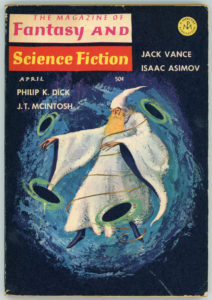 Hertzberg, Arthur, The Emancipation: A Reassessment After Two Centuries, Modern Judaism, V 1, N 1, May, 1981
Hertzberg, Arthur, The Emancipation: A Reassessment After Two Centuries, Modern Judaism, V 1, N 1, May, 1981
Other Publications
The Universal Jewish Encyclopedia, New York, N.Y., 1942
Websites
Guide to the Records of the American Jewish Committee – Office of Jewish War Records, undated, 1918-1921, 1962, processed by David Solomon, at Center for Jewish History
President Woodrow Wilson – Final Address in Support of the League of Nations, at American Rhetoric
Humboldt’s Gift, at GoodReads



